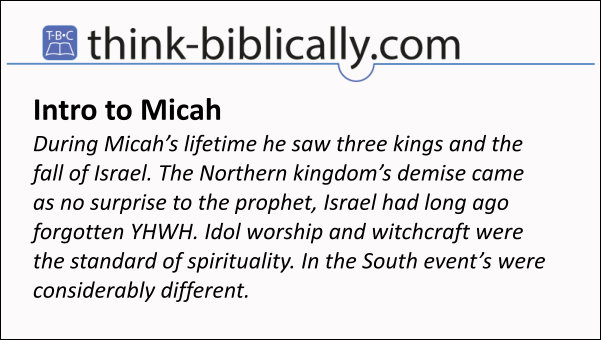By Tyson Thorne

When Jeremiah prophesied Assyria’s routing of Israel and Judah, he was promptly arrested and tried for treason (Jeremiah 26.7-.19). While the court debated his fate (most favoring Jeremiah’s execution) one councilman remembered a passage of God’s Word that applied to this situation. He recited Micah for the council, showing that when the prophet of old spoke those same words a century ago, he was not arrested for treason. Instead, the people repented and the Lord relented his wrath. The court agreed to follow the precedent of Micah and spared Jeremiah’s life. In this case, God’s Word literally leads to life.
During Micah’s lifetime he saw three kings and the fall of Israel. The Northern Kingdom’s demise came as no surprise to the prophet, Israel had long ago forgotten YHWH. Idol worship and witchcraft were the standard of spirituality. In the South event’s were considerably different.
Judah was under Jotham in Micah’s early days. Jotham continued expanding the military, but made only nominal spiritual reforms. Ethics disintegrated under his successor, Ahaz. Ahaz’s coronation took place at the moment the Northern kingdom made a desperate invasion. With weapon’s he had foolishly purchased from Assyria, Ahaz drove the invaders back behind the border. He encouraged idol worship and sacrificed his own sons in a fire to one such false God. With the rise of King Hezekiah Judah turned off her path to destruction. Real spiritual reform took place when he destroyed the nations idols, cleaned and reopened the temple, and re-instituted the Passover celebration. He kept the Assyrians at bay throughout his reign. Because of his faithfulness, God miraculously extended his life another fifteen years.
Author & Date of Writing
Micah, son of Moresheth, and a farmer ministered to Judah sometime between 750 and 686 BC. His country life gave him time to cultivate a deep relationship with God without distraction, which no doubt provided him with the perspective he needed to speak boldly before men of power. For these reasons God gave Micah a job, the job of prophet, and with it the ability to see the future. Micah saw the Assyrian invasion 120 years away, the birth of Christ 700 years into the future, and the peace of God’s kingdom yet to come.
The Book
- Judgment against Israel and Judah, 1.1-3.12
- Hope for Israel and Judah, 4.1-5.15
- Case against Israel, 6.1-.16
- Triumph for Israel and Judah, 7.1-.20
The great spiritual reform of Hezekiah’s reign came as a result of Micah’s prophecy. His courageous heart was given entirely to God, and enabled him to deliver this brutally honest message. Most of the book is prophecy of judgment and destruction, which would take place a little over a century later. But the book also contains unusual elements for a minor prophet.
One such element is Micah’s writing a passage most recognize from the book of Isaiah. Examine Micah 4.3:
“He will judge between many peoples and will settle disputes from strong nations far and wide. They will beat their swords into plowshares, and their spears into pruning hooks. Nation will not take up sword against nation, nor will they train for war anymore.”
Literary critics debate, did Isaiah copy from Micah, or was it the other way around? Did they both perhaps copy from a third, unknown document? Such overlap is uncommon, but not surprising. Both Isaiah and Micah were contemporaries, and though each book has a different physical author, both have the same spiritual author. Quite possibly YHWH delivered a common theme to both prophets to prove the authenticity of the message.
The second unusual element is the prophecy concerning Jesus Christ (5.1-5a). In these verses Micah discloses where the Savior will come from (Bethlehem), that He will rule over Israel (yet to come), and that his origin are from ancient times (John 1.1 parallels this truth). Though Micah saw these things, he had no idea when they would occur. As with all prophets, they saw clearly the events, but not the times. Peter clearly understood this when he penned,
“Concerning this salvation, the prophets who prophesied of the grace that was to be yours made careful search and inquiry, inquiring about the person or time that the Spirit of Christ within them indicated… that they were serving not themselves, but you….”
Scholars suggest that Jonah, Micah and Nahum are a set with the book of Micah being the anchor book. They come to this conclusion because Micah transitions and explains the views Jonah and Nahum have about Nineveh. Jonah is, of course, largely negative about the great pagan city whereas Nahum is fairly positive. Micah chapters four and five have opposing views of Nineveh, some positive and some negative, suggesting the question being put to the Gentile nations is: are you going to be Jonah's Nineveh or Nahum's Nineveh? Will you be judged or forgiven? Therefor Micah is what scholars call the "hermeneutical key" to Jonah and Nahum.
